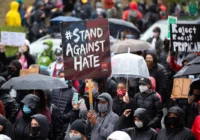The attention lavished on the Obama-Castro handshake belies the hard-work that is needed to create true, equal partnerships between the US and Latin America.
The handshake between US President Barack Obama and Cuban leader Raul Castro at the Summit of the Americas in Panama made history, as they gambled to overcome five decades of broken diplomatic relations.
Reopening embassies will not end the US economic embargo against Cuba, nor bring an automatic political opening in Cuba, but it is a crucial first step. On a larger stage, by addressing this Cold War relic of US foreign policy, Obama opened the door to implement his foreign policy doctrine of engagement in a region that is today stronger and less dependent on the United States than any time in the past.
Latin America has long sought to engage the United States on a more equal basis, chafing against US dominance over financial and regional organizations, and more recent foreign policy slights. After two decades of democratic and economic relative stability, trade diversity and foreign policy autonomy, the region is poised not only to engage the US on its own terms, but also to take more responsibility for its own affairs.
For the United States, the opportunity to deepen ties with peaceful and like-minded countries is vital for its own economic recovery, as well as its attempts to address transnational organized crime and drugs, migration and climate change.
Yet Obama’s entreaty to look to the future and stop blaming the United States for domestic political problems, and his hope that regional leaders would hold each other accountable to hemispheric commitments on democratic and human rights, did not come to fruition at the summit.
Although praising him for the opening with Cuba, regional leaders also chastised President Obama for placing sanctions on Venezuelan officials for human rights abuses, and several insisted on reciting a history of grievances against US interventionism in the region. As Obama quipped sardonically: “I always enjoy the history lessons I receive [at these gatherings].”
Why is it so difficult to move forward and overcome a complicated and combative past?
Similar to the internal peace process that attempted to end a 50-year civil war in Colombia, a history of distrust and trauma is difficult to overcome without acknowledging and taking responsibility for past wrongs and providing guarantees that the past will not be repeated. Although the history of US armed intervention in Central America and the Caribbean and of covert destabilization in South America is long past, recent clumsy events stoke the sensitivities of the region.
These range from the humiliating search of Bolivian President Evo Morales’ plane in Europe last year for presumed stowaway Edward Snowden to the executive order in March 2015 declaring Venezuela to be an extraordinary threat to the national security of the United States. To the expressed surprise and disappointment of American diplomats, even US allies in the region failed to echo its concerns about human rights in Venezuela, and instead unanimously condemned US intervention.
Overcoming traumatic pasts at the international level poses a second complication.
In a two-level game, national leaders are not only concerned with foreign relations, but also with maintaining political support at home. Democratic politics has allowed citizens to express their demands through the ballot box and in the streets, and requires leaders to be responsive or risk losing their office.
After the 2000s commodity boom dried up, South American governments lost the extraordinary revenues that helped millions climb up from poverty. Vociferous demands for the harder tasks of providing efficient government services, safe streets and control of corruption are now roiling the largest countries.
Anti-US Speeches
Backing the United States against Venezuela puts in jeopardy Caracas’ support for the Colombian peace process. It brings little political gain to center-left leaders in Chile, Brazil or Argentina, who have their own personal history of suffering human rights abuses. Other leaders have honed a revolutionary and anti-imperialist political message, aiming anti-US speeches at the summit at their domestic audiences.
Nevertheless, behind the scenes discussions at the summit signal greater integration and the potential for hemispheric cooperation. Personal interactions matter and justify summitry.
Brazilian President Dilma Rousseff announced she would visit the US in June, after canceling a visit abruptly in the wake of revelations in 2013 that the National Security Agency (NSA) spied on her cellphone.
Venezuelan President Nicolas Maduro met President Obama in a hallway on the eve of departure and then announced the potential for a rapprochement. The leaders’ repeated calls to address climate change and the announced US initiatives for renewable energy in the Caribbean and Central America, along with proposals for greater regional cooperation on educational exchange, are important steps forward.
The parallel civil society summit, though raucous, was important not only for providing citizen voices, but also to strengthen transnational movements and learning processes. The first-ever university leader parallel summit opened the door to revitalize higher education in the region, which is crucial for further economic progress.
In future summits, inter-sectoral discussions among business leaders, academic leaders, nongovernmental organizations (NGO) and governments could go much further in building the public-private partnerships needed to achieve summits’ lofty goals.
Thus, despite the worn messages harking to the past, and the slower-than-hoped for progress in US-Cuba relations, the Castro-Obama summit photo that swept around the world aptly reflects both the promise and the persistence needed to overcome an asymmetrical and conflicted past, and to realize the great potential for hemispheric cooperation and mutual benefit.
*[This article was originally published by The Conversation.] ![]()
The views expressed in this article are the author’s own and do not necessarily reflect Fair Observer’s editorial policy.
Photo Credit: Official US Navy Page / Flickr
 We bring you perspectives from around the world. Help us to inform and educate. Your donation is tax-deductible. Join over 400 people to become a donor or you could choose to be a sponsor.
We bring you perspectives from around the world. Help us to inform and educate. Your donation is tax-deductible. Join over 400 people to become a donor or you could choose to be a sponsor.
Support Fair Observer
We rely on your support for our independence, diversity and quality.
For more than 10 years, Fair Observer has been free, fair and independent. No billionaire owns us, no advertisers control us. We are a reader-supported nonprofit. Unlike many other publications, we keep our content free for readers regardless of where they live or whether they can afford to pay. We have no paywalls and no ads.
In the post-truth era of fake news, echo chambers and filter bubbles, we publish a plurality of perspectives from around the world. Anyone can publish with us, but everyone goes through a rigorous editorial process. So, you get fact-checked, well-reasoned content instead of noise.
We publish 2,500+ voices from 90+ countries. We also conduct education and training programs
on subjects ranging from digital media and journalism to writing and critical thinking. This
doesn’t come cheap. Servers, editors, trainers and web developers cost
money.
Please consider supporting us on a regular basis as a recurring donor or a
sustaining member.
Will you support FO’s journalism?
We rely on your support for our independence, diversity and quality.







Comment